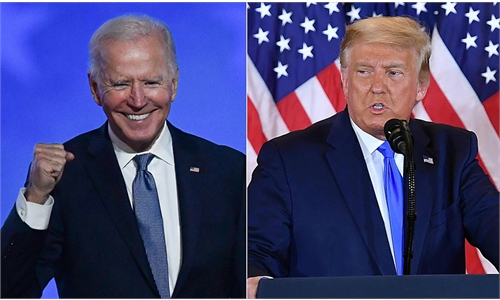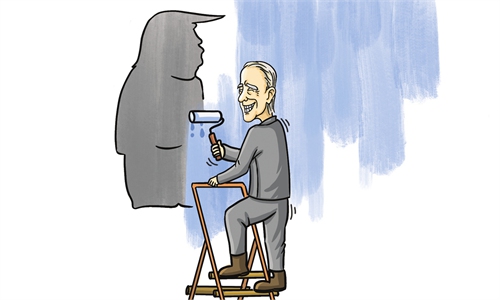
Illustration: Chen Xia/GT
The norms of upholding broad multilateral cooperation and win-win engagement with China ought to be pursued by the US, as the incoming Joe Biden administration is weighing up its new strategy on how to manage what many pundits define as the most important bilateral relationship in the world.
The international fight against a warming earth and deteriorating environment, a raging coronavirus pandemic, a contracting global economy and rapidly vanishing jobs, and a proliferation of dangerous weapons, calls for the new US government to conduct a closer consultation and partnership with Beijing. To put it candidly, the US alone cannot overcome these grave difficulties and get the job done.
The so-called Trumpism - brandishing the flag of "America First," cut-offs from multilateral institutions such as World Health Organization, Paris climate pact, Iran nuclear agreement, the Anti-Intermediate Missile Treaty and launching a suppressive trade war with China and other countries - should be repudiated.
The Trump administration has, as a matter of fact, failed to win the US a trophy of sorts from the international community, but instead exacerbated the world's divide and nation-to-nation animosity, while leaving the US itself at the mercy of COVID-19.
After being sworn in in January 2021, the new Biden administration will have to cope with the colossal mess left behind by the sitting president, as Trump's political appointees are now going to extraordinary lengths in their bid to prevent Biden from rolling back Trump's political legacy.
Breaking with past set protocols, disrupting and sabotaging US-China relations and bringing them to incessant lows is an integral part of that legacy. Just a few days ago, Trump's team were placing more Chinese companies on the country's punitive Entity List and announced names of more Chinese officials in Hong Kong for punishment.
Essentially, China has followed its principles and did not budge in the face of Trump's rounds of tariff escalations throughout 2019. The country even refused to trade-off Trump's dangling tariff cancelation on Chinese goods with his request or invitation to help him win reelection, because Beijing believed it was unethical and unjust to get embroiled in US internal affairs.
Now, China, having largely gotten the virus under control and with its economy again fired up by domestic spending and investments, has extended a friendly hand across the Pacific Ocean to the new Biden and Harris administration.
Beijing's message sent is clear, good-willed and visionary - the two economic superpowers can give up Trump's confrontational approach, sit and talk at the table, seek consensus and mutually acceptable solutions on trade, public health, clean air, non-proliferation and other issues of common concern, and open up a new course of cooperation and partnership.
The unprecedented-scale trade war which Trump launched in late 2018 and escalated in 2019 and China's tit-for-tat tariff retaliations have largely destroyed cooperation between the two giant economies. Trade between the two stalled significantly in 2019 and 2020, while punitive higher tariffs also disrupted the supply chains that all manufacturers rely on.
Banning Chinese companies like Huawei and Hikvision from accessing silicon microchip supplies from the US not only severely impacted those Chinese industrial plants, but also reduced China's high-value semiconductor imports from the US, draining business revenues of many US companies.
Forced to protect China's own industries, Beijing has meted out a new strategy to shore up a "dual circulation" economy that will focus on technology self-reliance and import substitution, in order to insulate China from outside blackmailing risks. To some extent, the "decoupling" of the world's two dominant economies - caused by Trump's relentless repression policy - will lead to an enlarging gap of technology standards that impedes global integration and economic growth.
The next Biden administration is almost certain to readjust Trump's antagonistic China policy, which is projected by many international affairs watchers, who believe Trump's confrontational and erratic approach, if not revised, will hurt the interests of both countries extensively, and bring the whole world into a cascading cycle of violent volatility.
Regardless of the next moves from the US, China seems firm in promoting reform and opening-up, trying to double its current $15 trillion GDP to $30 trillion by 2035. It has inked a landmark 15-nation free trade agreement in the Asia-Pacific region, named the Regional Comprehensive Economic Partnership, and has expressed its willingness to join another regional free trade pact, the CPTPP.
China has also vowed to resolutely promote the Belt and Road Initiative to help many less developed countries develop infrastructure and economy. The US is welcome to jump on the bandwagon, joining multilateral trade and investment groupings.
China hopes the new Biden administration does not inflame ideological quarrels and refrains from interfering in China's internal affairs too. Both socialism and capitalism can learn from each other to make an economy more equitable and sustainable. An earlier summit between the two countries' leaders will be instrumental to set their relations on a higher and more inspirational note.
Some Chinese foreign affairs experts say: If you make China the friend, China will be the friend. And if you make China the enemy, China will be the enemy.
The author is an editor with the Global Times. bizopinion@globaltimes.com.cn


